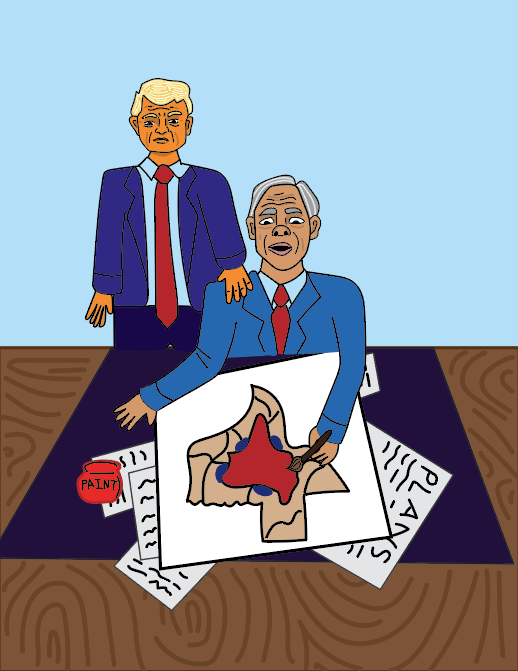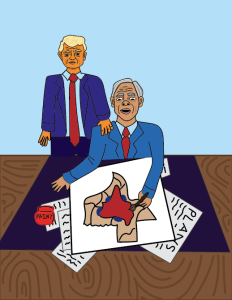Popular drama “Ginny and Georgia” is all over the place
May 25, 2021
Netflix seems to have the same pattern of releasing binge worthy, yet over-the-top high school shows that are packed with drama, twisted characters, and unrealistic fantasies of the world of high school. “Ginny and Georgia” is Netflix’s most recent show that has made its way to No. 1 on the charts, proves this to be quite true.
The show starts off with the main family: single mother Georgia, 15 year old Ginny, and nine-year-old Austin. It opens up with the family of three moving to the city of Wellsbury, Massachusetts. Georgia promises her Austin and Ginny that things will be “different” this time, and that they are finally settling down after years of moving to different states.
Georgia, who is young and very gorgeous, catches the eye of the attractive mayor of Wellsbury, and she tries to get her way into his level of authority by trying to impress him with marketing skills as well as her good looks. Ginny finds new friends in her new high school, and struggles with self-harm issues, choosing between two boys, and maintaining a stable relationship with her mysterious mother. Austin, meanwhile, faces anger issues in school and deals with typical school bullies.
The one thing I noticed when I first started this show was how dramatic every character is, including the side characters. The people that Ginny surrounded herself with in her high school were all over-the-top and angsty, and she and her three friends always went through the phases of wholesome moments, to betrayal, and then back to forgiveness. This seemed to be the endless cycle for the group of four.
The two main love interests for Ginny are the stereotypical “bad boy” and the popular boy of high school who has perfect grades. Even the adults, who were the classic ‘Karens’ who attend PTA meetings and only bring gluten free snacks, were over-the-top and reflected the teenagers in a way. I’d say that the only characters who acted normal were Marcus (the “bad boy”), and Joe, who works at the local Blue Farm Cafe.
Another thing about this show that I didn’t particularly enjoy was how all over the place it was. There were always multiple things going on, and sometimes, some important events were never seen. They were always just brought up in a brief conversation, and that was that.
Each scene was also different; sometimes it was a scene with drama, other times the scene would have love and passion, and sometimes it would be a wholesome scene with mother-daughter moments. The show is filled with unpredictable genres and tones that leave the audience questioning what is going on.
One thing I liked about this show was Georgia’s character, and how strong she was as a single mother. I love how the show included brief flashbacks to her past, and how mysterious she really is. We can see that she has done many illegal activities in the past, and that makes her dangerous and sharp-witted. She’s able to quickly adapt to her surroundings, and manipulate people easily so she can get what she wants.
Even though she slowly starts becoming the villain towards the end, I love how all her motives are out of love for her children. She would do anything for Ginny and Austin, and you can truly see that when she kills Kenny, one of Georgia’s “older” husbands with a wealthy background.
Ginny, who in a way is a parallel of Georgia, is frustrated because she doesn’t know anything about her mother’s past, and that forms a rift in their relationship. I think Ginny was ungrateful at times because she couldn’t see how much her mother truly did for her. I like how the show depicted Ginny and Georgia’s relationship more as sisters and less as Georgia being a mother and Ginny being a daughter, as it showed how close in age they were, and how they acted so similar.
I liked how the show touched on the topics of racism and inequality, but the way they depicted it was unrealistic and too dramatic. In my opinion, the way the show portrayed these topics seemed too forced, and didn’t seem like it was there for the sole purpose to inform the audience of the seriousness of these topics.
There was the classic “racist teacher,” who would target Ginny purely because she was mixed raced. It seemed as though the teacher was put in the show simply to display racism and how Ginny handled it.
There are also a few brief scenes that show Ginny burning herself with a lighter to display how she hurts herself, and to render in the theme of self-harm. Scenes of her self-harm were scattered throughout the show, and were not clearly touched on. I feel like they should have gone over this subject more in the show, as it really explains the complexity of Ginny and her character.
Overall, I would rate this show a solid 3 out of 5, as it was fun to binge because of the all-over-the-place storyline. Although it has its many flaws and faults, the use of drama throughout the series and its notable plot makes it a very unique show.









